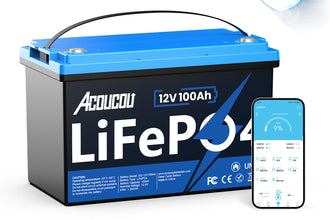

When it comes to powering various applications, two popular battery technologies stand out: LiFePO4 (Lithium Iron Phosphate) and lead-acid batteries. Both have their unique characteristics and advantages, and understanding the differences between them is crucial in making an informed decision. Let's delve into the world of LiFePO4 and lead-acid batteries to understand which one suits your needs best.
Lead-Acid Battery
What is Lead-Acid Battery?
The lead–acid battery is a type of rechargeable battery. The electrode is mainly made of lead and its oxides, and the electrolyte is a sulfuric acid solution. In the discharge state of lead-acid batteries, the main component of the positive electrode is lead dioxide, and the negative electrode is lead; in the charging state, the main component of the positive and negative electrodes is lead sulfate.
Pros:
- Lower Cost: Lead-acid batteries are generally more affordable compared to other types of batteries.
- Wide Availability: These batteries are widely available and easy to find in most places.
- High Surge Current: Lead-acid batteries can deliver high surge currents, making them suitable for applications that require a sudden burst of power, such as starting an engine.
Cons:
- Short Service Life: Lead-acid batteries usually can not be used for 10 years and have a limited number of charge/discharge cycles compared to other battery types.
- Heavy and Bulky: Lead-acid batteries are heavy and bulky, which can be a disadvantage in applications where weight and space are constraints.
- Maintenance Required: Most lead-acid batteries need regular maintenance, including topping up electrolyte levels and cleaning terminals. However, sealed lead-acid (SLA) batteries are maintenance-free.
- Toxic Chemicals: Lead-acid batteries contain toxic chemicals, such as sulfuric acid and lead, which can be harmful to the environment and dangerous if not disposed of properly.

LiFePO4 Battery
Pros:
- High Energy Density and Lightweight: LiFePO4 batteries have a higher energy density compared to lead-acid batteries, meaning they can store more energy in a smaller and lighter package. LiFePO4 battery is much lighter than lead-acid battery. Acoucou LiFePO4 12V 100Ah is 29.98 lbs nearly 1/3 of the weight of the same type of lead-acid battery.
- Longer Cycle Life: LiFePO4 batteries can withstand a large number of charge/discharge cycles, making them durable and long-lasting. It can generally last for 7 to 10 years of use. Acoucou LiFePO4 battery has more than 6000 cycles and a 10-year life.
- Maintenance-Free: Unlike lead-acid batteries, LiFePO4 batteries do not require regular water replenishment.
- Fast Charging: These batteries can be charged at a faster rate compared to lead-acid batteries, reducing downtime. There are 3 flexible charging ways of Acoucou for your energy storage.
- Safety and Eco-Friendly: LiFePO4 batteries are the safest battery type available today. BMS can protect the battery better and make it last longer. They have no cobalt or rare earth elements. Being built with non-toxic materials. Acoucou LiFePO4 battery has a built-in BMS that people can check the situation of batteries through Bluetooth in the APP.
- Wide Operating Temperature Range: They can operate effectively in a broad range of temperatures and can be used for various scenarios. Acoucou LiFePO4 batteries can work between -20 ℃ and 45 ℃.
Cons:
- High Cost: LiFePO4 batteries are generally more expensive to manufacture than some other lithium-ion batteries due to the materials involved.
- Not Resistant to Low Temperatures: When the temperature is below -10 ℃, they decay very quickly, and can only maintain about 50% to 60% of normal battery capacity under -20 ℃.












